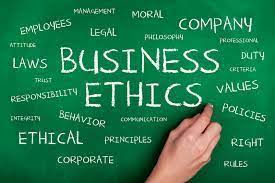LRN and Tapestry Networks Issue Important Guidance for Corporate Boards and CEOs to Build and Manage Ethical Cultures

You can always count on LRN. No ifs, ands or buts, LRN continues to issue the highest-quality and most meaningful research and guidance on ethics and compliance programs. LRN digs in to ask the hard questions, measures important trends and consistently provides importance support and guidance for corporate governance. LRN is a must read in these areas.
Now that I finished by promotional rant, let’s turn to LRN and Tapestry Network’s most recent paper, Assessing Corporate Culture: A Practical Guide to Improving Board Oversight. For a more detailed discussion, please listen to my latest podcast on the subject in which I interview Ty Francis, LRN’s Chief Advisory Officer, who guided this recent project.
LRN’s latest report was the result of a combined effort involving 40 directors and executives from 60 public companies, including McKesson, Coca-Cola and Sony. This group was titled the Ethics, Culture and Compliance Network (ECCN).

LRN’s report reflects an important understanding of a company’s ethical culture. As I have said for years, a company’s ethical culture is its most important internal control. If promoted effectively, companies that instill a culture of ethics will experience improved employee morale, increased employee productivity, lower employee turnover rates, and most importantly, significant decreases in employee misconduct. All of this combines to support one critical conclusion — ethical companies perform better in the marketplace than companies that ignore or do not attend to their ethical cultures.
I sound like a broken record, and I apologize but it is frustrating when you analyze this issue. Consider this — if I told a company that it could improve its revenue performance by 40 percent if it maintained an effective culture of ethics, would senior management approve such an investment? I know this is rhetorical but the linkage between culture and financial performance is so clear and the failure of business leaders and corporate boards to understand this is inexplicable.
The truth is that corporate boards and CEOs do not know how to execute a plan or oversee a program to promote a company’s ethical culture. No one will admit it but I have seen this disconnect all too often.
This is where LRN’s latest report comes in. LRN’s report provides a practical guide on how corporate boards and senior management can address the issue. As Donna Boehme always says, “This is a bioard worthy document,” that every board member and CEO should read.
The bottom line from LRN’s report is that corporate directors need to attend to this issue as an important step to improve oversight of company culture, collaborate with senior management, and achieve positive results in business performance, including customer satisfaction, employee loyalty, innovation and growth. LRN’s report provides instruction on how senior executives and the board can define and improve the company’s ethical culture.

Corporate boards have to focus on five distinct objectives:
(1) Prioritize culture on the board agenda to ensure that board members obtain information needed to analyze and assess on an ongoing basis a company’s culture;
(2) Foster a speak up culture throughout the organization, including at the board and in senior management communications with board members;
(3) Measure and monitor the company’s culture with established data sets and maintain robust benchmarking and trends analysis;
(4) Define the company’s culture in practical terms that are defined so that directions, measurement and objectives are readily discernible; and
(5) Designate a person (Chief Ethics Officer or Chief Ethics and Compliance Officer) responsible for the company’s culture and ensure direct reporting to the board and senior management.
Within this framework , there are important objectives that have to be addressed on a continuing basis. These include:
- Devote sufficient time to definition of a company’s culture, its values, and objectives;
- Ensuring that the board devotes adequate time to oversight, monitoring and promotion of the company’s ethical culture;
- Encouraging senior management and the corporate board to communicate on positive and negative results and honest discussions of issues; and
- Establish meaningful ethical culture measures and report regularly on performance against these measures.
















There are two trends in Corporate America that are consistent with LRN and Tapestry’s paper. They are the current emphasis on Environment, Social, and Governance at the Board level and Diversity, Equity, and Inclusion in the Board, Management, Employee, and the Corporate Supply Chain. Most major corporations with international operations have identified improving diversity as part of their corporate culture and one of their top missions.